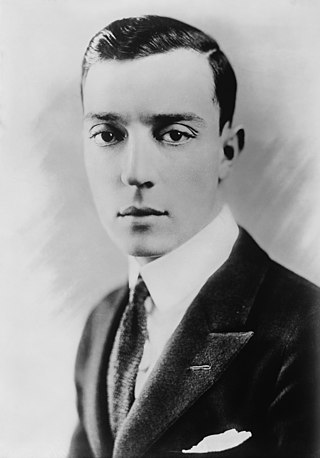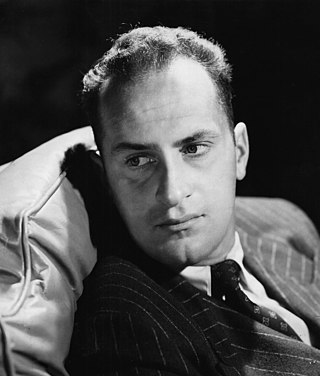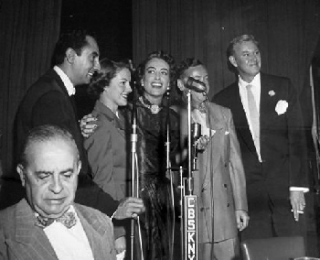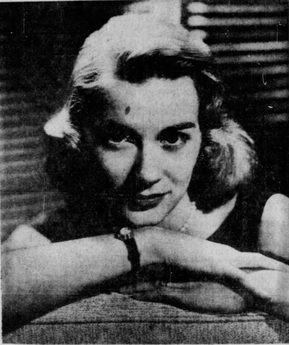
Joseph Frank "Buster" Keaton was an American actor, comedian and filmmaker. He is best known for his silent films during the 1920s, in which he performed physical comedy and inventive stunts. He frequently maintained a stoic, deadpan facial expression that became his trademark and earned him the nickname "The Great Stone Face".
This is an overview of 1921 in film, including significant events, a list of films released and notable births and deaths.

Isaiah Edwin Leopold, better known as Ed Wynn, was an American actor and comedian. He began his career in vaudeville in 1903 and was known for his Perfect Fool comedy character, his pioneering radio show of the 1930s, and his later career as a dramatic actor, which continued into the 1960s. His variety show (1949–1950), The Ed Wynn Show, won a Peabody Award and an Emmy Award.

General Electric Theater is an American anthology series hosted by Ronald Reagan that was broadcast on CBS radio and television. The series was sponsored by General Electric's Department of Public Relations.

Francis Xavier Aloysius James Jeremiah Keenan Wynn was an American character actor. His expressive face was his stock-in-trade; though he rarely carried the lead role, he had prominent billing in most of his film and television roles.

Playhouse 90 is an American television anthology drama series that aired on CBS from 1956 to 1960 for a total of 133 episodes. The show was produced at CBS Television City in Los Angeles, California. Since live anthology drama series of the mid-1950s usually were hour-long shows, the title highlighted the network's intention to present something unusual: a weekly series of hour-and-a-half-long dramas rather than 60-minute plays.

Educational Pictures, also known as Educational Film Exchanges, Inc. or Educational Films Corporation of America, was an American film production and film distribution company founded in 1916 by Earle Hammons (1882–1962). Educational primarily distributed short subjects; it is best known for its series of comedies starring Buster Keaton and the earliest screen appearances of Shirley Temple (1932–34). The company ceased production in 1938, and finally closed in 1940 when its film library was sold at auction.

Lux Video Theatre is an American television anthology series that was produced from 1950 until 1957. The series presented both comedy and drama in original teleplays, as well as abridged adaptations of films and plays.

Naked City is an American police procedural television series from Screen Gems that aired on ABC from 1958 to 1963. It was inspired by the 1948 motion picture The Naked City and mimics its dramatic "semi-documentary" format. As in the film, each episode concluded with a narrator intoning the iconic line: "There are eight million stories in the naked city. This has been one of them."

Shower of Stars is an American anthology variety television series broadcast live in the United States from 1954 to 1958 by CBS. The series was broadcast in color which was a departure from the usual CBS programming practices of the 1950s.

Mickey's Gala Premier is a Walt Disney cartoon produced in 1933, directed by Burt Gillett, and featuring parodies of several famous Hollywood film actors from the 1930s. It was the 58th Mickey Mouse short film, and the eighth of that year.

Martin Ellyot Manulis was an American television, film, and theatre producer. Manulis was best known for his work in the 1950s producing the CBS Television programs Suspense, Studio One Summer Theatre, Climax!, The Best of Broadway and Playhouse 90. He was the sole producer of the award-winning drama series, Playhouse 90, during its first two seasons from 1956 to 1958.

The Saphead is a 1920 American comedy-drama film featuring Buster Keaton. It was the actor's first starring role in a full-length feature and the film that launched his career as a leading man. Keaton was cast on the recommendation of Douglas Fairbanks.

William Paul Lundigan was an American film actor. His more than 125 films include Dodge City (1939), The Fighting 69th (1940), The Sea Hawk (1940), Santa Fe Trail (1940), Dishonored Lady (1947), Pinky (1949), Love Nest (1951) with Marilyn Monroe, The House on Telegraph Hill (1951), I'd Climb the Highest Mountain (1951) and Inferno (1953).

Screen Directors Playhouse is an American radio and television anthology series which brought leading Hollywood actors to the NBC microphones beginning in 1949. The radio program broadcast adaptations of films, with original directors of the films sometimes involved in the productions, although their participation was usually limited to introducing the radio adaptations and taking a brief "curtain call" with the cast and host at the end of the program. During the 1955–56 season, the series was seen on television, focusing on original teleplays and several adaptations of famous short stories.

Easy to Wed is a 1946 Technicolor American musical comedy film directed by Edward Buzzell, and starring Van Johnson, Esther Williams, Lucille Ball, and Keenan Wynn. The screenplay by Dorothy Kingsley is an adaptation of the screenplay of the 1936 film Libeled Lady by Maurine Dallas Watkins, Howard Emmett Rogers, and George Oppenheimer.

"Helen Morgan" is an American television play broadcast on May 16, 1957, as part of the CBS television series, Playhouse 90. It was the 33rd episode of the first season of Playhouse 90.

"The Innocent Sleep" is an American television play broadcast live on June 5, 1958, as part of the second season of the CBS television series Playhouse 90. Tad Mosel wrote the teleplay, and Franklin Schaffner directed. Hope Lange, John Ericson, and Buster Keaton starred, and Raymond Burr was the host.

"The Troublemakers" was an American television play broadcast on November 21, 1957, as part of the second season of the CBS television series Playhouse 90. John Frankenheimer directed. Ben Gazzara, Barbara Rush, and Keenan Wynn starred.


















